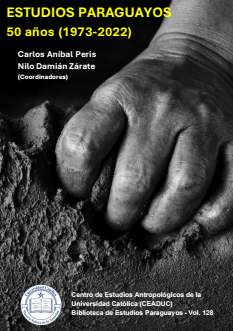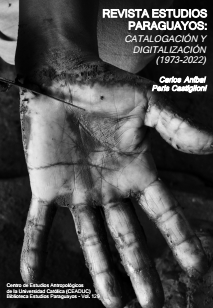A Participation in stage performances as a proposal for strengthening
DOI:
https://doi.org/10.47133/respy42-24-1-05Keywords:
Artistic Education, stage performances, teachers, Basic School EducationAbstract
In Paraguay, artistic education is a mandatory subject, in the first cycle, second and third cycle of Basic School Education in Paraguay, which is established by the Ministry of Education and Sciences (MEC). The subject is divided into four major disciplines: Plastic arts, dance, music and theater. A teacher who is involved in the exercise of teaching must strengthen its artistic capabilities, so that it is tangible and an experiential journey for the student. This study aimed to analyze effective and timely strategies in teachers in order to strengthen artistic capabilities. Considering this objective, the participation of teachers (attendance or involvement) in scenic artistic representations is proposed, considering them as an opportunity to strengthen artistic capacities and competencies in teachers of Basic School Education in Paraguay. The methodology used had a qualitative approach, using methods and techniques that help interpret the perceptions of the participants, whose sample was made up of n=4. To collect information, a semi-structured individual interview was applied, with 7 open questions, which led the participants to be able to express their perception of the aforementioned proposal.
Downloads
References
Bajac, A. M. (2017). El Museo Escolar como entorno inclusivo para la Educación Artística. Educación artística: revista de investigación, (8), 32-46.
Barrios, A. M., Veiga, M., & Méndez, C. (2015). Viviendo Música (1a-9a ed., Vol. 9). Atlas.
Denzin, N. K., & Lincoln, Y. (2012). Manual de investigación cualitativa. Gedisa. https://dialnet.unirioja.es/servlet/libro?codigo=490631
Díaz Bravo, L., Torruco García, U., Martínez Hernández, M., & Varela Ruíz, M. (2013). La entrevista, recurso flexible y dinámico. Investigación en Educación Médica, 2(7), 162-167. https://doi.org/10.1016/S2007-5057(13)72706-6
Gamarra, S. V. (2023). Necesidades formativas docentes de Educación Artística de Nivel Medio. Aula pyahu, 1(1), 151-162. https://doi.org/10.47133/rdap2023-11art11
González-Sanmartín, V. A., & Yanacallo-Pilco, W. V. (2020). "Aprender haciendo": Aplicación de la metodología por ambientes de aprendizaje. Polo del conocimiento, 5(7), 188-208. https://doi.org/10.23857/pc.v5i7.1503
Hernández-Umaña, B. A. (2021). Capacidades artísticas para la paz y el desarrollo complejos: un reto para la cooperación internacional. En Ciencia política y relaciones internacionales. un mundo en cambio acelerado, una disciplina para entender y actuar. Sección II - Herramientas de análisis y de intervención (Vol. 2, pp. 165-180). https://hemeroteca.unad.edu.co/index.php/book/article/view/5237/4973
Ley No 5749. Que establece la Carta Orgánica del Ministerio de Educación y Ciencias. (2017). BACCN Paraguay. https://www.bacn.gov.py/leyes-paraguayas/5260/establece-la-carta-organica-del-ministerio-de-educacion-y-ciencias
Lifeder. (2022, 1 de septiembre). Representación teatral. https://www.lifeder.com/representacion-teatral/
Mateiro, T. (2010). Músicos, Pedagogos y Arte-Educadores con especialidad en Educación Musical: Un análisis sobre la formación docente en países suramericanos. Profesorado: revista de currículum y formación del profesorado, 14(2), 30-40. http://www.ugr.es/local/recfpro/rev142ART3.pdf
Medina, J. L. (2011). Orientaciones conceptuales sobre la formación del profesorado [Documento policopiado]. Universidad de Barcelona.
Medina, J. L. (2013). Una reconceptualización de los saberes profesionales que se enseñan en la universidad: más allá de las competencias. En J. L. Medina & B. Jarauta (Eds.), Enseñanza y aprendizaje en la educación superior (Cap. 2). Síntesis.
Ministerio de Educación y Ciencias. (2020). Diseño curricular. Profesorado de Educación Escolar Básica para el 1° y 2° ciclo. Viceministerio de Educación Superior y Ciencias. Dirección General de Formación Profesional del Educador.
Ministerio de Educación y Ciencias. (2022). Priorización de propuestas curriculares: Primer y segundo ciclo de la Educación Escolar Básica. Gobierno Nacional del Paraguay.
Provalis Research. (2023, 4 mayo). QDA Miner Lite version - Provalis Research. https://provalisresearch.com/es/products/software-de-analisis-cualitativo/freeware/
Salcedo-Barzola, P., Castro-Salcedo, J. P., & Rivadeneira-González, C. A. (2018). El arte escénico como medio de comunicación: Diseño de talleres dirigidos a jóvenes - Provincia Santa Helena. Revista Caribeña de Ciencias Sociales. https://www.eumed.net/rev/caribe/2018/04/talleres-cine-jovenes.html
Schulmann, L. (2005). Conocimiento y enseñanza: Fundamentos de la nueva reforma. Revista de Currículum y Formación Del Profesorado, 9(2), 1–30.
Sistema de Información de Tendencias Educativas en América Latina. (2018). Perfil país Paraguay [Archivo digital]. UNESCO. https://siteal.iiep.unesco.org/sites/default/files/sit_accion_files/siteal_paraguay_0802.pdf
Published
How to Cite
Issue
Section
License
Copyright (c) 2024 Analía Verónica Ferreira Castellano, Gamaliel Benítez-Notario y Revista Estudios Paraguayos

This work is licensed under a Creative Commons Attribution 4.0 International License.
















